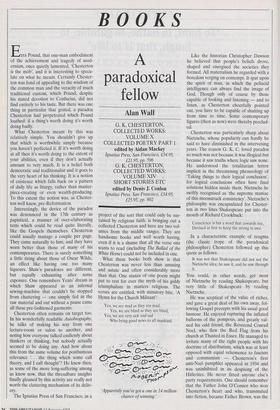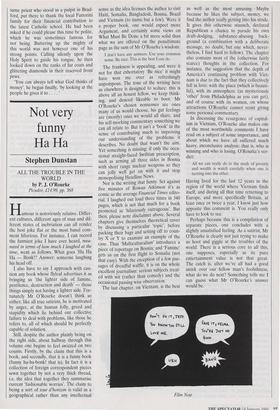BOOKS
A paradoxical fellow
Alan Wall
G. K. CHESTERTON, COLLECTED WORKS: VOLUME X COLLECTED POETRY PART 1 edited by Aidan Mackey Ignatius Press, San Francisco, £34.95, £21.95, pp. 596 G. K. CHESTERTON, COLLECTED WORKS: VOLUME XIV SHORT STORIES ETC edited by Denis J. Conlon Ignatius Press, San Francisco, £34.95, £25.95, pp. 802 Ezra Pound, that one-man embodiment of the achievement and tragedy of mod- ernism, once quietly lamented, 'Chesterton is the mob', and it is interesting to specu- late on what he meant. Certainly Chester- ton was fond of appealing to the wisdom of the common man and the veracity of much traditional custom, which Pound, despite his stated devotion to Confucius, did not find entirely to his taste. But there was one thing in particular that grated, a paradox Chesterton had perpetrated which Pound loathed: if a thing's worth doing it's worth doing badly.
What Chesterton meant by this was relatively simple. You shouldn't give up that which is worthwhile simply because you haven't perfected it. If it's worth doing at all then it's worth doing to the extent of your abilities, even if they don't actually amount to very much. It is a belief both democratic and traditionalist and it goes to the very heart of his thinking. It is a notion of existence which falls back on a pattern of daily life as liturgy, rather than master- piece-creating or even wealth-producing. To this extent the notion was, as Chester- ton well knew, pre-Reformation.
Interestingly, the device of the paradox was denounced in the 17th century as papistical, a manner of over-elaborating texts which could be read quite literally, like the Gospels themselves. Chesterton could usually manage a couple per page. They came naturally to him, and they have worn better than those of many of his contemporaries. There is surely something a little tiring about those of Oscar Wilde, an effect like having one too many liqueurs. Shaw's paradoxes are different, but equally exhausting after some exposure. One remembers Yeats' dream in which Shaw appeared as an infernal sewing-machine that couldn't be stopped from chattering — one simply fed in the raw material and out without a pause came all these pre-fashioned garments.
Chesterton often remains on target too. In his wonderfully readable Autobiography, he talks of making his way from one lecture-room or salon to another, and noting how everyone talked endlessly about thinkers or thinking, but nobody actually seemed to be doing any. And how about this from the same volume for posthumous relevance `. . . the thing which some call theory, and I call thought'? He knew then, as some of the more long-suffering among us know now, that the threadbare insights finally gleaned by this activity are really not worth the clattering mechanism of its deliv- ery.
The Ignatius Press of San Francisco, in a
project of the sort that could only be sus- tained by religious faith, is bringing out a collected Chesterton and here are two vol- umes from the middle ranges. They are handsome books and well worth having, even if it is a shame that all the verse one wants to read (including The Ballad of the White Horse) could not be included in one.
What these books both show is that Chesterton was never less than amusing and astute and often considerably more than that. One stanza of one poem might put to rest for ever the myth of his giddy triumphalism in matters religious. The verses are entitled, with minatory bite, 'A Hymn for the Church Militant':
Yea, we are mad as they are mad, Yea, we are blind as they are blind, Yea, we are very sick and sad Who bring good news to all mankind.
Apparently you've got a one in 14 million chance of winning.' Like the historian Christopher Dawson he believed that people's beliefs drove, shaped and energised the societies they formed. All materialism he regarded with a boredom verging on contempt. It spat upon the spirit of man, in which the pellucid intelligence can always find the image of God. Though only of course by those capable of looking and listening — and to listen, as Chesterton cheerfully pointed out, you have to be capable of shutting up from time to time. Some contemporary figures (then as now) were thereby preclud- ed.
Chesterton was particularly sharp about Nietzsche, whose popularity can hardly be said to have diminished in the intervening years. The reason G. K. C. loved paradox so much was not because it was illogical but because it saw truths where logic saw none. He understood the totalitarian terror implicit in the threatening phraseology of `Taking things to their logical conclusion', for logical conclusions often have final solutions hidden inside them. Nietzsche he swiftly recognised as 'the supreme maniac of this moonstruck consistency'. Nietzsche's philosophy was encapsulated for Chester- ton in two lines Shakespeare put into the mouth of Richard Crookback:
Conscience is but a word that cowards use, Devised at first to keep the strong in awe.
In a characteristic example of zeugma (the classic trope of the paradoxical philosopher) Chesterton followed up this quote as follows:
It was not that Shakespeare did not see the Nietzsche idea; he saw it, and he saw through it.
You could, in other words, get most of Nietzsche by reading Shakespeare, but very little of Shakespeare by reading Nietzsche.
He was sceptical of the value of riches, and gave a great deal of his own away, fol- lowing Gospel precepts with his usual good humour. He enjoyed rupturing the inflated balloons of the pompous, and greatly val- ued his odd friend, the Reverend Conrad Noel, who flew the Red Flag from his church at Thaxted in Essex. He managed to irritate many of the right people with his doctrine of distributism, which was at least opposed with equal vehemence to fascism and communism — Chesterton's first anti-Nazi pamphlet appeared in 1934 and was uninhibited in its despising of the Hitlerites. He never fitted anyone else's party requirements. One should remember that the Father John O'Connor who won Chesterton's heart and who, transmuted into fiction, became Father Brown, was the same priest who stood in a pulpit in Brad- ford, put there to thank the local Fattorini family for their financial contribution to the latest Catholic school. He had been asked if he could please this time be polite, which he was sometimes famous for not being. Buttering up the mighty of this world was not however one of his strong points. Calling silently upon the Holy Spirit to guide his tongue, he then looked down on the ranks of fur coats and glittering diamonds in their reserved front pews.
`You can always tell what God thinks of money', he began finally, 'by looking at the people he gives it to . . . . '










































 Previous page
Previous page